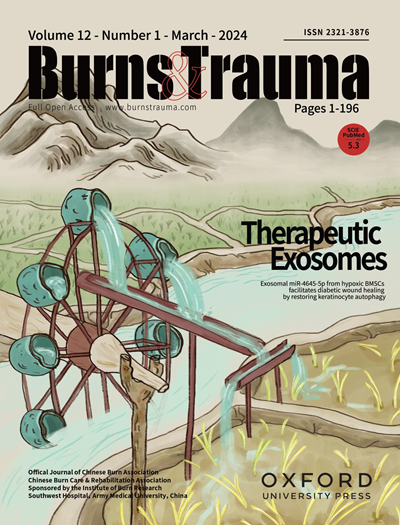Who is at risk of clinical deterioration? Adverse events among trauma patients undergoing intra-hospital transport for emergent computerized tomography
IF 9.6
1区 医学
Q1 DERMATOLOGY
引用次数: 0
Abstract
Computerized tomography is an essential element of the early diagnostic stages of trauma care for hemodynamically stable patients. However, there are inherent challenges and risks associated with the intra-hospital transport of critically injured trauma patients to the radiology suite and during the scanning process itself. We examined the frequency and nature of adverse events during computerized tomography among critically injured patients. This is a retrospective cohort study of adverse event in critically injured adult (>18 years old) trauma patients who underwent emergent computerized tomographic scan following evaluation in the trauma bay over a 22-month period who were either admitted to the intensive care unit or the operating room post computerized tomography. Data was abstracted from the hospital's trauma registry and chart review of electronic medical records. The frequency of adverse events during computerized tomography and the associated patient transport phases was recorded. Multivariable logistic regression was performed to assess the impact of adverse event on 7-day in-hospital mortality. Of the 526 critically injured trauma patients who underwent computerized tomographic scan during the study period, 17.3% (91/526) experienced one or more adverse event. The most common adverse events were hypotension n = 50 (9.5%), hypertension n = 18 (3.4%), initiation of vasopressors n = 11 (2.1%) and vomiting n = 8 (1.5%). One patient required re-intubation following endotracheal tube dislodgement and one patient required intubation following hypoxia post-sedation for agitation. Patient factors independently associated with adverse event were mechanical ventilation and blood product administration. When adjusted for injury severity score and age, patients who experienced adverse event were at increased odds of death (odds ratio: 2.2, 95% confidence interval: 1.11–4.36) compared to those who did not experience adverse event. Adverse events occur frequently in critically injured patients undergoing emergent trauma computerized tomography and may significantly impact clinical outcomes. This study provides important information to guide system and process-level improvements including optimized designs of the built environment and safety-informed protocols for high-risk patients undergoing emergent trauma computerized tomography.谁有临床恶化的风险?急诊计算机断层扫描创伤患者院内转运的不良事件
计算机断层扫描是血流动力学稳定患者创伤护理早期诊断阶段的重要组成部分。然而,在医院内将重伤创伤患者运送到放射科病房和扫描过程本身存在固有的挑战和风险。我们检查了危重伤员计算机断层扫描期间不良事件的频率和性质。这是一项回顾性队列研究,对22个月期间在创伤室评估后接受紧急计算机断层扫描的重伤成人(bb0 - 18岁)创伤患者的不良事件进行了回顾性队列研究,这些患者在计算机断层扫描后住进重症监护室或手术室。数据摘自医院的创伤登记和电子医疗记录的图表审查。记录计算机断层扫描期间不良事件的频率和相关的患者转移期。采用多变量logistic回归评估不良事件对住院7天死亡率的影响。在研究期间接受计算机断层扫描的526名重症创伤患者中,17.3%(91/526)经历了一次或多次不良事件。最常见的不良事件是低血压n = 50(9.5%),高血压n = 18(3.4%),开始使用血管加压药物n = 11(2.1%)和呕吐n = 8(1.5%)。1例患者因气管导管移位需要重新插管,1例患者因镇静后躁动缺氧需要插管。与不良事件独立相关的患者因素是机械通气和血液制品管理。经损伤严重程度评分和年龄调整后,与未发生不良事件的患者相比,发生不良事件的患者死亡几率增加(优势比:2.2,95%可信区间:1.11-4.36)。不良事件经常发生在接受紧急创伤计算机断层扫描的重伤患者中,并可能显著影响临床结果。该研究为指导系统和流程水平的改进提供了重要信息,包括建筑环境的优化设计和高危患者接受紧急创伤计算机断层扫描的安全知情协议。
本文章由计算机程序翻译,如有差异,请以英文原文为准。
求助全文
约1分钟内获得全文
求助全文
来源期刊

Burns & Trauma
医学-皮肤病学
CiteScore
8.40
自引率
9.40%
发文量
186
审稿时长
6 weeks
期刊介绍:
The first open access journal in the field of burns and trauma injury in the Asia-Pacific region, Burns & Trauma publishes the latest developments in basic, clinical and translational research in the field. With a special focus on prevention, clinical treatment and basic research, the journal welcomes submissions in various aspects of biomaterials, tissue engineering, stem cells, critical care, immunobiology, skin transplantation, and the prevention and regeneration of burns and trauma injuries. With an expert Editorial Board and a team of dedicated scientific editors, the journal enjoys a large readership and is supported by Southwest Hospital, which covers authors'' article processing charges.
 求助内容:
求助内容: 应助结果提醒方式:
应助结果提醒方式:


